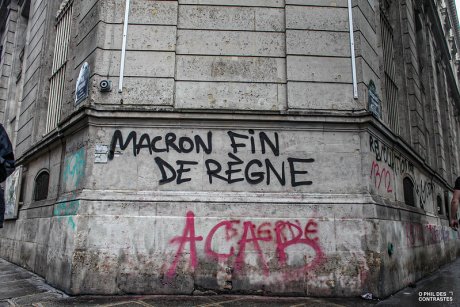After an intense May Day, union leaders announced another day of strikes to take place at the start of June. Clearly, they would like to turn the page on the pension battle, but the situation, marked by Macron’s inflexibility and the rank and file’s continued anger, won’t allow them to do so. They are therefore forced to continue the fight and continue putting pressure on the French state, an approach they’ve adopted since the beginning of the movement. “Pending the decision on the referendum, the Inter-Union welcomes the bill to repeal the pension reform that will be on the agenda on June 8 in the National Assembly,” the Inter-Union wrote in its last statement before calling for “meeting MPs everywhere to urge them to vote for this bill” and “to ramp up these initiatives with a new day of joint action, strikes, and demonstrations on June 6.”
After months of failure in the Assembly, the Senate, and the Constitutional Council, the Inter-Union’s position refuses any assessment of the strategy they have deployed. Instead, they are calling for ever more spaced-out, isolated days intended to send a message to parliamentarians, rather than building up the balance of forces with a renewable strike. Worse yet, all the representative organizations of the Inter-Union, including the CGT [the General Confederation of Labor], confirmed at the same time their agreement to return to “social dialogue” — negotiations — at the invitation of the Prime Minister.
The Two Sides of the Inter-Union
By thus refusing to give the workers’ movement the slightest bit of a wider strategic perspective, the Inter-Union seeks to continue co-opting the profound process of class struggle that opened on January 19 in order to bury it.
The key to the unity of the Inter-Union is their desire to avoid accelerating the process that has opened up a “pre-revolutionary moment.” They seek to avoid a major change in the balance of class forces and the open politicization of the workers’ mobilization, especially against Macron. The trade union unity played a progressive role at the beginning of the movement by encouraging workers tired of trade union divisions to enter the struggle. Now it has plays an even stronger role as an obstacle, preventing radicalization.
Unlike previous battles, this support of the Inter-Union has limited the possibility for the vanguard to take stock of its leadership’s defeatist strategy. A large number of intellectuals, who totally absolve the Inter-Union and its strategy in their analysis of the movement, have favored such a state of affairs, as we have already criticized in our response to Ugo Palheta.
Against this complacent attitude, we must remember what Leon Trotsky said. Trotsky understood the logic of French trade unionism more deeply than many leftist intellectuals of yesterday and today.
The revolutionary criticized not only Jouhaux, leader of the CGT, who Trotsky described as “the most corrupt and servile of the agents of capital,” but also his left wing.
The task of the honest revolutionary, especially in France where the unpunished betrayals are countless, consists in reminding the workers of the experience of the past, in immersing the youth in intransigence, in tirelessly repeating the history of the betrayal of the Second International and of French syndicalism, in unmasking the shameful role played not only by Jouhaux but above all by the French “left” syndicalists, such as Merrheim and Dumoulin. Anyone who does not carry out this elementary task towards the new generation forever deprives himself of the right to revolutionary confidence.
Such a recommendation is particularly important today. Unlike with previous social movements, the trade union leaderships emerge from the movement strengthened. They use the fact that the movement has continued to mask their own role in weakening it.
No return to normal
Despite the decline of the mobilization due to the Inter-Union’s defeatist strategy, there is still no return to normal. On the contrary, the struggle remains unresolved, demonstrating once again the power of the movement. Let’s look at some examples.
First of all, May 1 was intense. During the 13th mobilization against the pension reform, there were demonstrations organized in about 300 cities. Police claim that 782,000 people gathered together in the streets, while the CGT claims the number was 2.3 million. This is the second most important May Day in the last thirty years. It far exceeds the May Day of 2009, which gathered 465,000 demonstrators on the heels of the global financial crisis.
The current upward trend is distinct from the momentum seen during the fight against the 2010 pension reform. At that time, Nicolas Sarkozy enacted a law that raised the legal retirement age from 60 to 62. The mobilization at the time fell back within two weeks. At its end, it brought together only a little more than 50,000 people throughout France. All this indicates the depth of the current movement as well as its enduring power.
At the same time, since Macron wanted to turn the page on pension reform, every trip made by the Head of State and his ministers has been met with demonstrations and pot and pan banging. This generates a real concern in the spheres of power, which have continued to intensify the implementation of repressive measures such as a ban on portable sound devices. We can see more proof that those in power are nervous.
Finally, while inflation continues at a high level, severely impacting working-class pockets, the struggle’s demands multiply. As Aline Leclerc writes in Le Monde,
While the pension reform has eclipsed them since January, mobilizations to obtain raises have not stopped in the context of the mandatory annual negotiations (NAO) which are generally held at the very end or beginning of the year. Let us mention, for example, the movement underway since March 20 at Vertbaudet near Lille, the strike at Tisséo that shut down the Toulouse public transport network, that of the employees of the Cémoi chocolate factory, in Orne, Blédina, Brive-la-Gaillarde (Corrèze), the logistics base of Intermarché, Michelin, Amazon, Alstom sites, and even employees of the video game giant Ubisoft, a first. Unprecedented too are the walkouts in two Truffaut garden centers, the most recent of which was in Ivry-sur-Seine (Val-de-Marne) on Saturday, April 22.
This is further proof that the refusal of the Inter-Union to go beyond the withdrawal of the reform is suicidal for a possible victory in the battle for pensions. They refuse to raise the question of wages and the cost of living, when these things are immediate emergencies for the working classes.
A latent pre-revolutionary situation
As we have said, the “moment” with all the elements for a pre-revolutionary period has been squandered by the Inter-Union. Yet some sectors of the workers are still battling with just as much determination to win. France’s president comes out very weakened from this pyrrhic victory, and we are witnessing a turning point in the organic crisis of French capitalism that affects the legitimacy of the political regime. For historian Pierre Rosanvallon, “We have been going through the most serious democratic crisis that France has known since the end of the Algerian conflict [in 1962].”
Rosanvallon is perhaps exaggerating a little. But the gravity of the situation is already beginning to impact the areas where the government has, until now, felt strong: the economy. The current political impasse has been highlighted by the rating agency Fitch. Despite the adoption of the pension reform, Fitch downgraded France’s credit rating. In its April 29 press release, Fitch said that “the political impasse and (sometimes violent) social movements” that the country has experienced over the past three months “pose a risk to Emmanuel Macron’s reform agenda and could create pressure for a more expansionary fiscal policy or a reversal of previous reforms.”
Because Macron still has four years in office, and the polarization of political life and the crisis of former left-right alliances create political instability and weaken of the electoral safety valve, the current situation can be defined as a “latent pre-revolutionary situation.” Or it is a transitional situation, whose dynamics are not yet defined. It is possible that a situation could develop where the government manages to at least partially control the strong contradictions that have opened up. Such a scenario would lead to a non-revolutionary situation and one characterized by new social and political confrontations, with ups and downs, which could open up a truly pre-revolutionary situation. Here we must recognize the possibility of bifurcations in the historical process. The contradictory, and therefore confusing, nature of such situations, subject to abrupt reversals, makes understanding them complicated.
As Trotsky points out in situations like this one, “It is precisely these transitional states that are of decisive importance from the point of view of political strategy.” Why? Because they define the general direction of the class struggle. Far from any automatism or fatalism, for the founder of the Red Army the action or inaction of a revolutionary force, even with limited forces, was a determining factor in how such a situation evolves.
In this sense, one of the tasks that we must tackle in the coming weeks and months will be to draw up a clear strategic balance sheet of the events, denouncing the return to “social dialogue” by the trade union leaderships, while continuing to strengthen the framework of coordination and self-organization of the vanguard and, potentially, the masses in struggle. This is what awaits the Network for the General Strike (RGG) in this current phase of the conflict. Simultaneously, we must deepen the debates about the need for a political organization, and the need for an anti-capitalist, communist, and revolutionary party as a tool to lead these struggles and fight for an alternative to the current crisis.
First published in French on May 6 on Révolution Permanente.
Translation by Stacey Bear
Modified for clarity by Sam Carliner and Jason Koslowski











